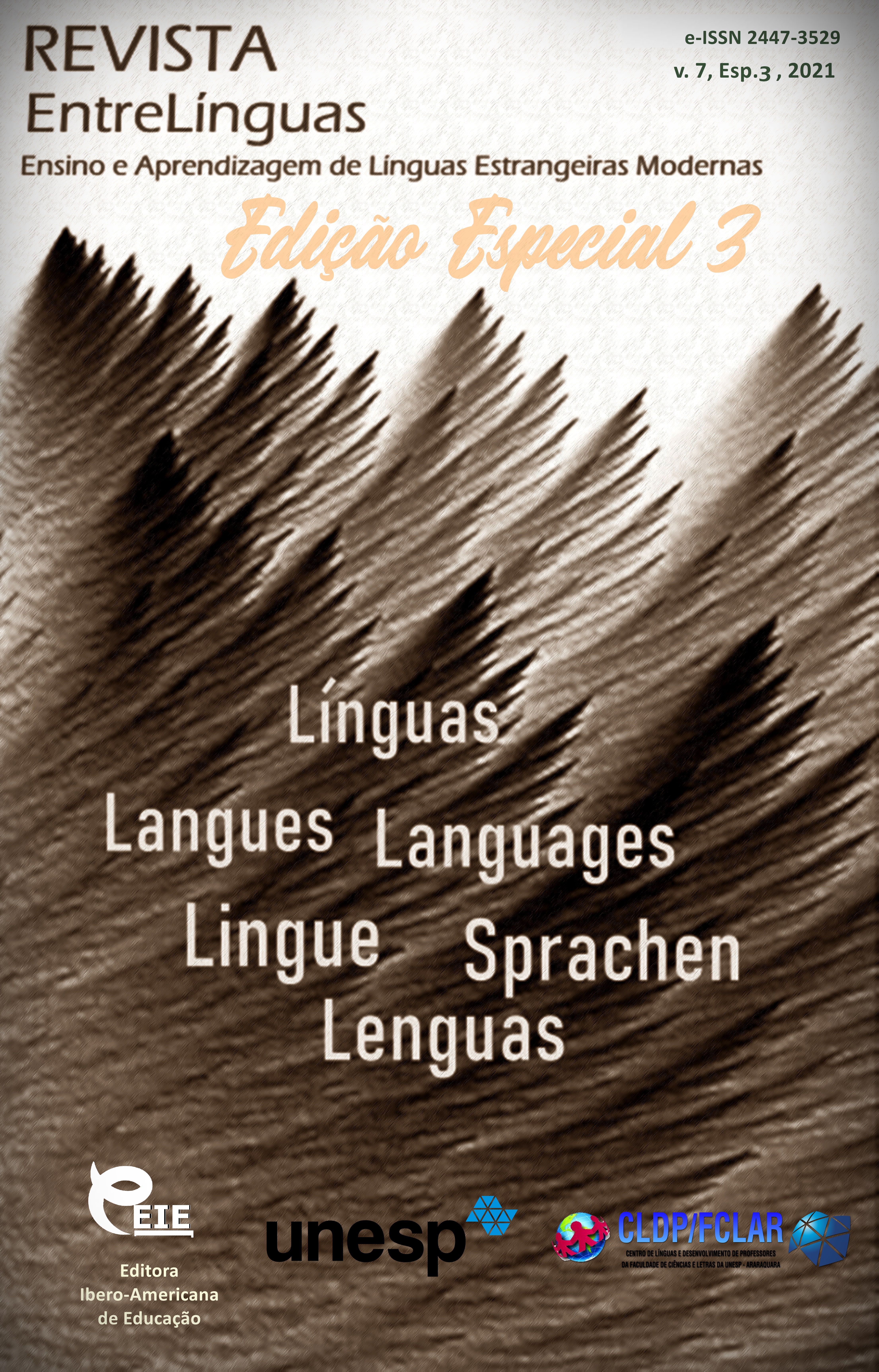Neologismos no discurso sociopolítico da língua francesa moderna
DOI:
https://doi.org/10.29051/el.v7iesp.3.15713Palavras-chave:
Linguagem, Linguística, Discurso, Mídia, Neologia, Afixação, Formação de palavras compostas, Língua francesaResumo
O artigo é dedicado à investigação do status funcional e das características estruturais das inovações lexicais no discurso sociopolítico da língua francesa. O material de pesquisa constitui dicionários explicativos de francês como Le Petit Larousse, Le Petit Robert e versões online de periódicos (jornais diários Le Monde, Le Figaro, semanário Le Nouvel Observateur). A urgência da pesquisa suscita a necessidade de definição precisa da noção de “neologismo” e, como consequência, fundamentação teórica dos mecanismos de neologização do vocabulário com base em critérios escolhidos para sua descrição. O objetivo da pesquisa é o estudo dos mecanismos de ativação e funcionamento dos neologismos no discurso sociopolítico de língua francesa. É mostrado no artigo que, apesar da dinâmica ativa do vocabulário da política moderna, a fixação lexicográfica de neologismos se distingue pela cautela suficiente em virtude de razões objetivas. Atenção particular é dada à análise do plano de conteúdo das unidades lexicais extraídas de dicionários explicativos de francês. As formas mais produtivas de formação de neologismos lexicais na esfera sociopolítica do francês são revistas. A novidade do estudo está no envolvimento de dados de análise de textos de mídia para descobrir os principais vetores do desenvolvimento do vocabulário da língua francesa moderna.
Downloads
Referências
AGEEVA, A. V.; ABDULLINA, L. R.; ARTAMONOVA, E. V. Corpus linguistics tools for loanwords and borrowings studies. Special Issue of Journal of Research in Applied Linguistics, v. 10, p. 468-477, 2019.
AKHMETOVA, L. A. et al. The word-formation category displacement causation: mutational and modification semantics of german, russian and tatar verbs. XLinguae, v. 12, n. 1, p. 21-36, 2019
BOULANGER, J-C. Les dictionnaires et la neologie: le point de vue duconsommateur. In: TERMINOLOGIE ET TECHNOLOGIES NOUVELLES, 1988, Quebec. Actas do […]. Quebec: Gouvernement du Quebec, 1988. p. 291-318.
CLUB D’ORTHIGRAPHE DE GRENOBLE. Mots Nouveaux du Petit Larousse. 2006. Available: https://orthogrenoble.net/mots-nouveaux-dictionnaires/entrees-petit-larousse-2006/2006. Access: 10 Dec. 2020.
CLUB D’ORTHIGRAPHE DE GRENOBLE. Mots Nouveaux du Petit Larousse. 2010. Available: https://orthogrenoble.net/mots-nouveaux-dictionnaires/entrees-petit-larousse-2010/. Access: 10 Dec. 2020.
CLUB D’ORTHIGRAPHE DE GRENOBLE. Mots Nouveaux du Petit Larousse. 2012. Available: https://orthogrenoble.net/mots-nouveaux-dictionnaires/entrees-petit-larousse-2012/. Access: 10 Dec. 2020
CLUB D’ORTHIGRAPHE DE GRENOBLE. Mots Nouveaux du Petit Larousse. 2016. Available: https://orthogrenoble.net/mots-nouveaux-dictionnaires/entrees-petit-larousse-2006/. Access: 10 Dec. 2020.
CLUB D’ORTHIGRAPHE DE GRENOBLE. Mots Nouveaux du Petit Larousse. 2017. Available: https://orthogrenoble.net/mots-nouveaux-dictionnaires/entrees-petit-larousse-2006/. Access: 10 Dec. 2020.
DEPUTATOVA, N. A. et al. Extra-linguistic features of the southern dialect of american english in the novel of harper lee “go set a watchman”. Journal of Educational and Social Research, v. 9, n. 3, p. 117-124, 2019.
GABDREEVA, N. V. Inoyazychnaya leksika v russkom yazyke noveyshem perioda: monographia [Foreign vocabulary in the modern Russian language: a monograph]. Moscow, Flinta, 2019. 328 p.
GAK, V. G. O sovremennoy frantsuzkoy neologii [About modern French neology]. Leningrad: Nauka, 1978. 52 p.
KADLEC, J. Les néologismes en français contemporain centrés sur la presse [Электронный ресурс]. 2015. Available: http://www.theses.cz/id/iiizv7/DP.pdf. Access: 10 Dec. 2020.
LEVIT, Z. N. Leksikologia frantzuskovogo yazyka [French lexicology]. Moscow: Vyshaya shkola, 1979. 160 p.
MASLOVA, G. D. Neologismy v sovrevennom frantzuskom yazyke na materiale suffiksalnykh i prefiksalnykh imen sushchestvitelnykh [Neologisms in modern French on material of suffix and prefix nouns]. Moscow: MOPI 1961. v. СVIII, p. 145-157.
SABLAYROLLES, J-F. Neologisme et nouveaute. Cahiers de Lexicologie, v. LX, p. 5-42, 1996.
SAKHARNYI, L. V. K tainam mysli i slova [To the secrets of thoughts and words]. Moscow: Prosveshchenie, 1983. 159 p.
TAKHTAROVA, S. S.; ABUZYAROVA, D. L.; KUZMINA, O. D. Сommunication between population of germany and german-speaking switzerland: intra- or intercultural communication? Academic Journal of Interdisciplinary Studies, v. 8, n. 2, p. 126-130, 2019.
TVMONDE5. Langue française: les nouveaux mots du Larousse et du Rober. 2015. Available: http://information.tv5monde.com/info/langue-francaise-les-mots-de-l-annee-34004. Access: 10 Dec. 2020.
ZEMSKAYA, E. A. Slovoobrazovanie kak deyatelnost [Word formation as an activity]. Moscow: Komkniga, 2005. 224 p.
Downloads
Publicado
Como Citar
Edição
Seção
Licença

Este trabalho está licenciado sob uma licença Creative Commons Attribution-NonCommercial-ShareAlike 4.0 International License.
Os manuscritos aceitos e publicados são de propriedade da Revista EntreLínguas. Os artigos publicados e as referências citadas na Revista EntreLínguas são de inteira responsabilidade de seus autores.
Transferência de direitos autorais – autorização para publicação
Caso o artigo submetido seja aprovado para publicação, já fica acordado que o(s) autor(es) autoriza(m) a UNESP a reproduzi-lo e publicá-lo na EntreLínguas, entendendo-se os termos “reprodução” e “publicação” conforme definição respectivamente dos incisos VI e I do artigo 5° da Lei 9610/98. O artigo poderá ser acessado pela rede mundial de computadores (Internet), sendo permitidas, a título gratuito, a consulta e a reprodução de exemplar do artigo para uso próprio de quem a consulta, desde que haja a citação ao texto consultado. Essa autorização de publicação 328 EntreLínguas, Araraquara, v. 1, n .2, p. 323-328, jul./dez. 2015 não tem limitação de tempo, ficando a UNESP responsável pela manutenção da identificação do(s) autor(es) do artigo. Os artigos publicados e as referências citadas na Revista EntreLínguas são de inteira responsabilidade de seus autores.











